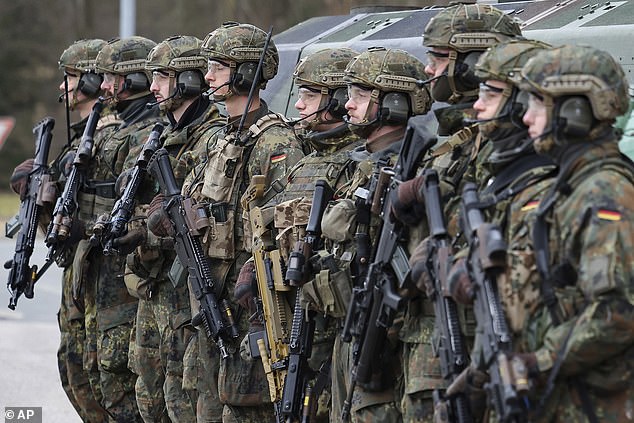Germany is moving towards military conscription with a lottery for men over the age of 18 as the country attempts to make up numbers in its army.
A dispute over the new military service law – which has been simmering for months – was finally settled on Wednesday evening after the centre-right political alliance CDU/CSU and Social Democratic Party (SPD) reached a compromise with the Defence Minister Boris Pistorius.
Under the agreement, all 18-year-old men will be required to undergo a conscription medical examination. If there are not enough volunteers among those declared ‘fit for military service’, a lottery will decide who will be called up to join the armed forces.
The much-criticised ‘double lottery’ system has been scrapped. Instead, there will be a single physical conscription examination – an approach that was originally agreed upon by the CDU/CSU and SPD in the Bundestag.
The earlier plan had proposed two rounds of selection – a first lottery to decide who would undergo conscription, and a second to pick additional candidates it too few volunteered. This idea, however, has now been dropped.
As part of the broader agreement, both parties have also set troop growth targets.
If voluntary recruitment fails to meet those goals, the Bundestag will be able to activate a ‘needs-based’ conscription system – potentially using a random selection process, the German Press Agency reports.
Pistorius has estimated that between 3,000 and 5,000 additional conscripts will be needed each year from 2026 onwards to maintain the country’s military readiness.

Soldiers attend training at the Panzergrenadierbataillon 122 in the Grenzland barracks, Oberviechtach, Germany, February 28, 2024

Pistorius has estimated that between 3,000 and 5,000 additional conscripts will be needed each year from 2026 onwards to maintain the country’s military readiness
The parliamentary groups are expected to be officially informed of the deal on Thursday morning, before details are made public.
CSU MP Thomas Erndl, 51, who negotiates on military service for the Union, had already signalled earlier in the week: ‘If the number of volunteers, the growth of the reserve or the growth path for active duty personnel is not sustainably achieved, then as a last resort, compulsory conscription aligned with the needs of the armed forces will be necessary’.
However, the agreement does not resolve all tensions between Pistorius and the coalition partners.
According to unconfirmed reports from within the parliamentary groups, the minister conceded to the government parties’ demands for a concrete personnel plan – the so-called ‘troop increase’ – for the Bundeswehr.
Uncertainty remains around other controversial aspects of Pistorius’s plan – notably his proposal for ‘super-short-term soldiers’.
These recruits would receive only minimal training, without combat instruction, and would be assigned to guard buildings.
Critics in the CDU/CSU accused the minister of trying to use such roles to artificially boost recruitment statistics.
The original draft law, developed jointly by the SPD and CDU/CSU, had outlined a four-step process – first encouraging voluntary enlistment, then relying on a lottery of there were too few volunteers.
But in mid-October, Pistorius reportedly rejected the concept in a fit of rage during an SPD parliamentary group meeting, saying he felt sidelined.
Since then, negotiations have continued between a four-member defence policy team from the governing parties – Siemtje Moller, 42, and Falko Droßmann, 51, for the SPD, and Norbert Rottgen, 60, and Thoman Erndl, 51, for the CDU/CSU.
